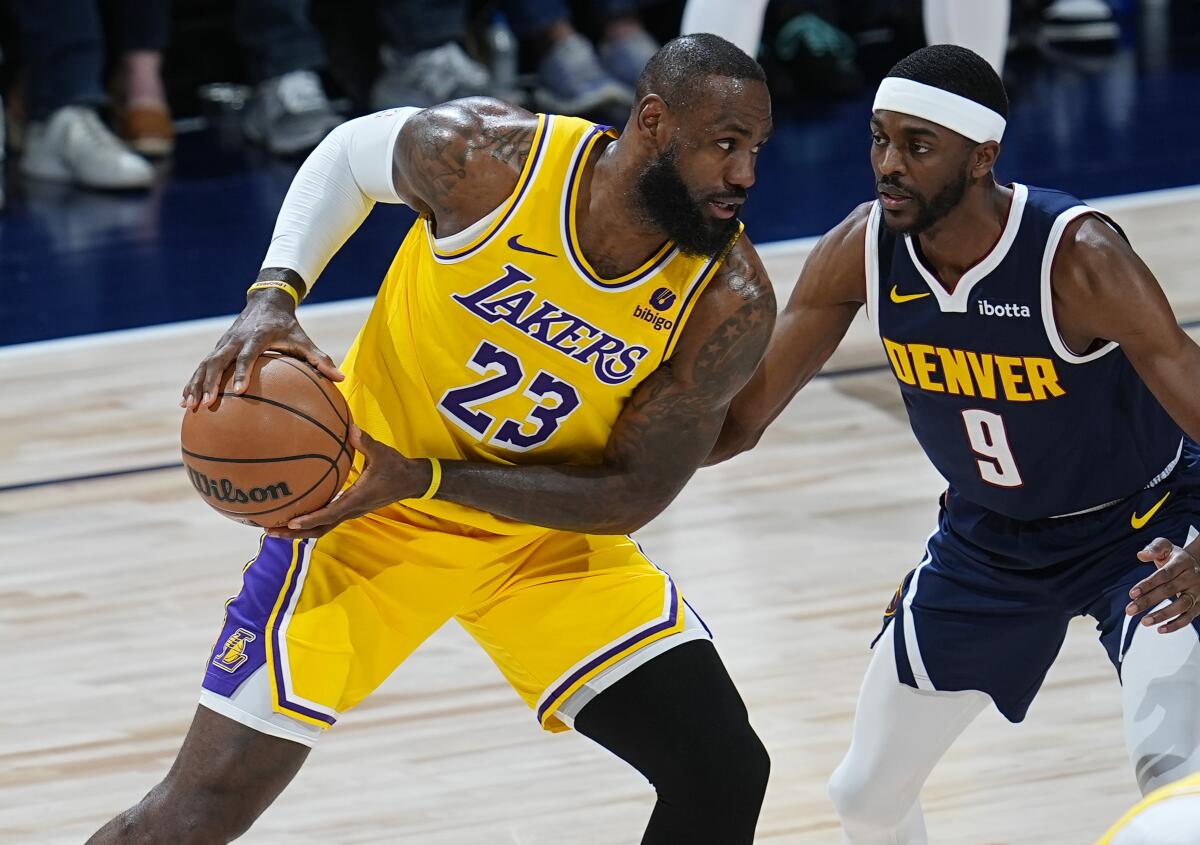A detailed analysis of the Lakers vs Denver Nuggets Match Player Stats, focusing on key performances, strategic adjustments, and what this means for both teams moving forward.
Introduction
Basketball fans around the world are always captivated when two titans like the Los Angeles Lakers and the Denver Nuggets clash on the court. The rivalry between these two teams has produced some of the most intense, edge-of-the-seat basketball games, and analyzing the player stats from such matches provides valuable insights into the strategies and performances that shape the outcome. In this blog, we will take a deep dive into the “Lakers vs Denver Nuggets match player stats,” focusing on how each player contributed, the key moments of the game, and how individual performances collectively influenced the match’s final result.
The Importance of Player Stats in Modern Basketball
Player stats have become an integral part of modern basketball analysis. Coaches, analysts, and fans rely on these numbers to measure performance, identify strengths and weaknesses, and predict future outcomes. In a Lakers vs Denver Nuggets match, these stats serve as a tool to understand which players made a difference and how their efforts aligned with team success. Metrics like points, assists, rebounds, and shooting percentages all come together to form the larger picture.
LeBron James
In the recent Lakers vs Denver Nuggets match, LeBron James once again proved why he is considered one of the greatest basketball players of all time. With 31 points, 9 rebounds, and 8 assists, he led the Lakers’ offensive and defensive efforts, contributing significantly to their overall performance. James’ ability to control the pace of the game, whether through his playmaking or scoring, is unmatched. His high shooting percentage from both inside and outside the arc demonstrated his versatility, making him a threat throughout the game.
Anthony Davis
Anthony Davis was pivotal in securing the Lakers victory, contributing both offensively and defensively. Scoring 27 points and grabbing 11 rebounds, Davis showcased his offensive prowess. However, his real impact was on the defensive end, where his 4 blocks and 3 steals stifled Denver’s offense. Davis’ ability to protect the paint gave the Lakers a significant edge, forcing the Nuggets to rely on perimeter shooting, which proved inconsistent throughout the game.

Jamal Murray
On the Denver Nuggets side, Jamal Murray took the spotlight with 24 points, 5 rebounds, and 8 assists. Murray’s ability to create scoring opportunities for both himself and his teammates was critical in keeping the game close. His shooting from beyond the arc was a major factor in the Nuggets’ offensive strategy, as they looked to stretch the Lakers’ defense. Murray’s playmaking and agility kept the Lakers on their toes, even though it wasn’t enough to tip the balance in Denver’s favor.
Michael Porter Jr.
Michael Porter Jr. had a solid performance, contributing 20 points and 8 rebounds for the Nuggets. Porter’s role as a secondary scorer behind Murray was crucial, especially in the second half when the Lakers started clamping down on defense. His ability to knock down three-pointers and drive to the basket gave Denver some breathing room, although his efforts couldn’t completely close the gap in the scoreline. Porter’s athleticism and versatility made him a key player for Denver, particularly in the third quarter when the Nuggets made a push to regain the lead.
Defensive Strategy
The Lakers’ defensive strategy was one of the most talked-about aspects of the game. With Anthony Davis leading the charge in the paint and LeBron James playing lockdown defense on the perimeter, the Lakers managed to contain Denver’s high-powered offense. They forced the Nuggets to take difficult shots and limited their second-chance opportunities. The Lakers’ team defense held Denver to a low shooting percentage, especially from three-point range, which was a critical factor in their win.
Rui Hachimura
While LeBron James and Anthony Davis stole most of the headlines, Rui Hachimura’s contributions were equally essential. Hachimura scored 14 points and grabbed 6 rebounds, providing the Lakers with much-needed energy off the bench. His hustle plays, including key rebounds and defensive stops, gave the Lakers an edge in the physical aspect of the game. Hachimura’s ability to impact both ends of the floor without needing the ball in his hands is a testament to his growing role within the team.

Aaron Gordon
Aaron Gordon’s contributions on the defensive end were critical for the Nuggets. Although he scored 18 points and grabbed 10 rebounds, it was his defense on LeBron James that made the biggest difference. Gordon’s ability to switch on defense and contest shots helped slow down the Lakers’ offense in key moments. His physicality in the post also forced the Lakers to adjust their offensive schemes, keeping the game competitive well into the fourth quarter.
D’Angelo Russell
D’Angelo Russell had an impressive outing with 22 points and 6 assists. Russell’s ability to hit clutch shots, especially from beyond the arc, provided the Lakers with the firepower they needed to keep the Nuggets at bay. His court vision allowed him to find open teammates for easy baskets, while his improved defense helped to disrupt Denver’s backcourt. Russell’s all-around game proved vital to the Lakers’ balanced attack.
Nikola Jokic
One of the surprises of the match was the underwhelming performance from Denver’s star, Nikola Jokic. While he contributed in various aspects, Jokic was held in check by the Lakers’ defensive schemes. His scoring was well below his usual output, and his inability to dominate in the paint gave the Lakers a significant advantage. Jokic’s passing was still on display, but without his usual scoring punch, the Nuggets struggled to keep pace with the Lakers.
Team Stats
When looking at the overall team stats, it’s clear that the Lakers had the upper hand. The Lakers shot 58.3% from the field compared to Denver’s 52.3%, and they also made more three-pointers. Both teams were evenly matched in assists, but the Lakers had the edge in rebounds, especially offensive boards, which gave them multiple second-chance opportunities. The Lakers’ superior field goal percentage and dominance on the boards were major factors in their victory.

Free Throws
Both teams went to the free-throw line frequently, but the Lakers were more efficient, hitting 76.2% of their free throws compared to Denver’s 71.4%. The ability to convert from the charity stripe, especially in close games, often decides the outcome, and this match was no different. The Lakers’ consistent free-throw shooting helped them maintain their lead in the closing minutes of the game.
Transition Play
The Lakers’ transition game was another key factor in their victory. With LeBron James leading fast breaks and Anthony Davis trailing for secondary options, the Lakers outpaced the Nuggets in transition points. Denver struggled to keep up with the Lakers’ quick tempo, and their transition defense was exploited throughout the game. The Lakers’ ability to turn defensive stops into fast-break points was a significant advantage.
Bench Contribution
In a tightly contested game like this, bench contributions often make the difference. The Lakers’ bench outscored Denver’s, thanks largely to Rui Hachimura and Austin Reaves. This depth allowed the Lakers to maintain a high level of play even when their starters were resting. On the other hand, Denver’s bench, though effective, couldn’t provide the same spark, which ultimately led to their downfall.
Coaching Strategies
The battle between the coaches was just as fascinating as the action on the court. Lakers’ coach Darvin Ham made key adjustments at halftime, particularly in switching defensive assignments and increasing the team’s pace. Denver’s coach Michael Malone, on the other hand, tried to counter with a focus on perimeter defense, but the Lakers’ versatile offense proved too difficult to contain.
Second-Half Adjustments
The game was closely contested in the first half, with both teams exchanging leads. However, in the second half, the Lakers made crucial adjustments, particularly on defense. They tightened up on the perimeter, limiting Denver’s three-point attempts, and forced the Nuggets into tough, contested shots. This shift in strategy paid off, as the Lakers were able to build a lead that they wouldn’t relinquish.
Closing Moments
The final minutes of the game were a showcase of the Lakers’ experience and poise. LeBron James took control, hitting key shots and orchestrating the offense to perfection. Anthony Davis continued to dominate on defense, making crucial blocks and securing important rebounds. Despite Denver’s efforts to mount a comeback, the Lakers’ composure in the closing moments ensured their victory.
Key Takeaways from the Match
This Lakers vs Denver Nuggets match highlighted several key aspects of both teams. For the Lakers, their ability to perform in high-pressure situations, coupled with their defensive adjustments, made the difference. For the Nuggets, while they showed flashes of brilliance, their reliance on perimeter shooting and lack of bench depth were significant weaknesses that the Lakers exploited.
Conclusion
As the Lakers vs Denver Nuggets Match Player Stats continue their respective seasons, this game serves as a learning experience for both teams. The Lakers will look to build on their momentum, while the Nuggets will need to address their defensive lapses and bench production if they hope to challenge for the championship. Player stats from this match not only reflect individual performances but also offer insights into the future strategies of both teams.
Read Also: Mega:btn4nowj9g4= Charizard Evolution Guide






